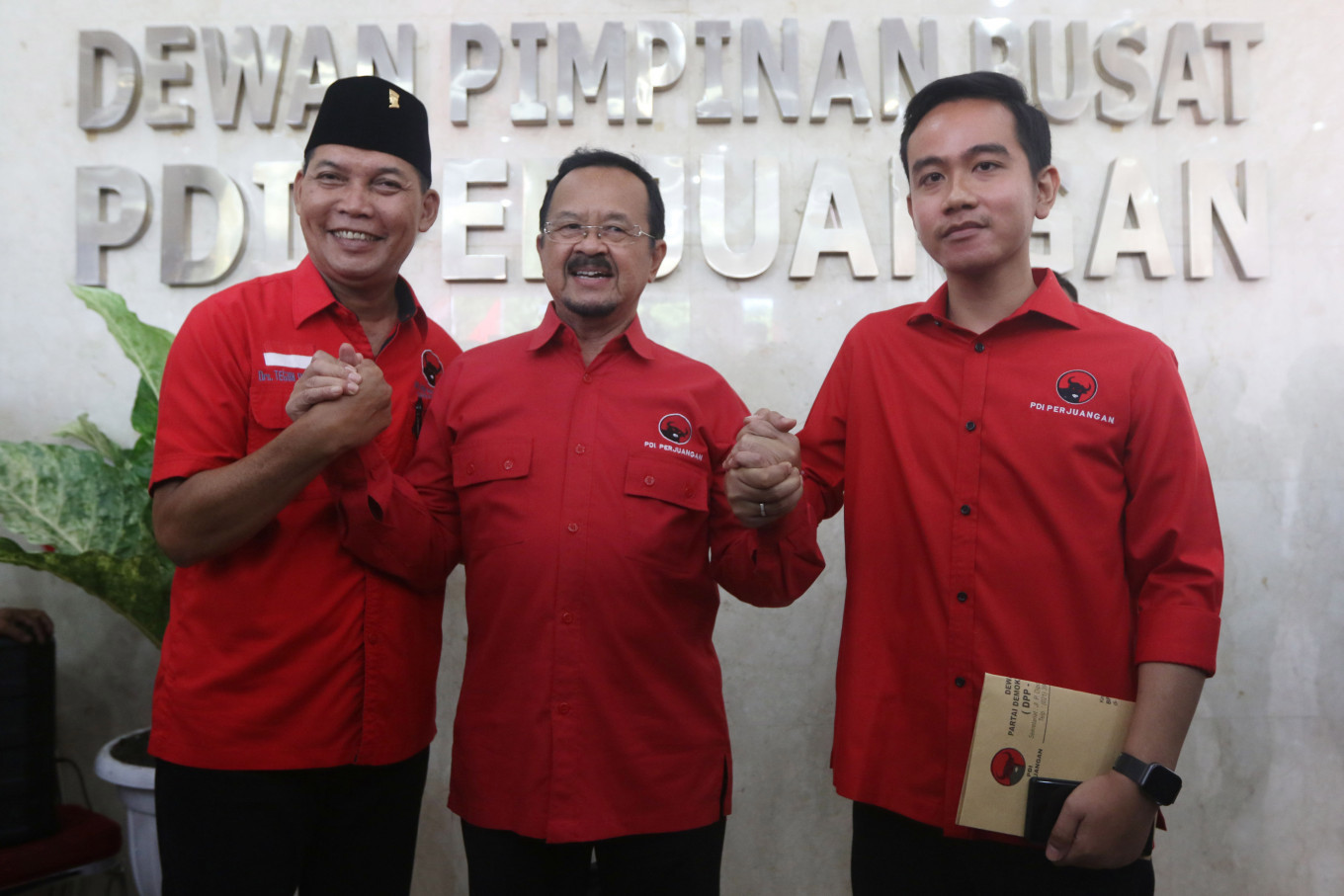Popular Reads
Top Results
Can't find what you're looking for?
View all search resultsPopular Reads
Top Results
Can't find what you're looking for?
View all search resultsPolitically wired millennials to contest December polls
The 2020 simultaneous regional elections are shaping up to be unpredictable competitions that will feature several young, high-profile and politically wired candidates.
Change text size
Gift Premium Articles
to Anyone
T
he 2020 simultaneous regional elections are shaping up to be unpredictable competitions that will feature several young, high-profile and politically wired candidates who are just entering politics and will seek to woo voters at the ballot, underscoring concerns over the lack of an established political party system to nominate candidates based on merit.
President Joko “Jokowi” Widodo’s eldest son Gibran Rakabuming Raka has finally obtained the blessing of the ruling Indonesian Democratic Party of Struggle (PDI-P) to run for the upcoming mayoral race in Surakarta, Central Java, this December alongside the PDI-P’s Surakarta branch secretary Teguh Prakosa.
Gibran’s nomination was secured after weeks of tensions between the ruling party’s central board and its Surakarta branch. The local chairman, incumbent Mayor FX Hadi Rudyatmo, previously planned to nominate his deputy Achmad Prakosa to the top position alongside Teguh as part of the selection process for the election.
Read also: Gibran, exception to PDI-P’s own rules
Instead, Rudy had to announce that Gibran and Teguh were on the ticket.
Gibran is not the only figure in the President’s closest circle to compete in the upcoming elections. Jokowi’s son-in-law Bobby Afif Nasution has also been nominated by the PDI-P to compete in the mayoral race in Medan, North Sumatra, alongside Gerindra Party politician Aulia Rahman.
As part of his nomination, Bobby also received support from the Golkar Party, Nasdem Party, Hanura Party, the United Development Party (PPP) and the Indonesian Solidarity Party (PSI).
Meanwhile, the upcoming mayoral race in South Tangerang, Banten, will see Rayahu “Saras” Saraswati Djojohadikusumo, niece of the current Defense Minister Prabowo Subianto, face off against the daughter of Vice President Ma’ruf Amin, Siti Nur Azizah.
Saras, a politician from Gerindra, will run for deputy mayor alongside the city’s current administrative secretary, Muhamad, while Azizah will run as mayoral candidate alongside her chosen deputy Ruhama Ben, a Prosperous Justice Party (PKS) politician.
In Kediri, East Java, the son of Cabinet Secretary Pramono Anung, Hanindhito Himawan Pramono, will also be vying for a spot as regent. He is pairing up with Dewi Maria Ulfa, leader of Kediri regency’s Fatayat Nahdlatul Ulama, the women’s wing of Nahdlatul Ulama (NU).
Many of these politically wired candidates will be going into politics for the first time, while others have held various roles in the local bureaucracy or as legislators. But they will be eyeing powerful positions in the upcoming regional elections that are to be held on Dec. 9.
One thing is certain: political analysts say that the current crop of election candidates reflects the continued relevance of political dynasties in Indonesia’s democracy, with some suggesting that the situation also reflects the lack of a meritocracy in the political party system, particularly as it relates to regeneration and the candidate-selection process.
“Our political structure is oligarchic and [allows for the flourishing of] political dynasties. It is no wonder that the names that have showed up [as candidates] come from those whose families are in power,” said Indonesia Political Review executive director Ujang Komarudin.
Read also: Millennials are taking over politics, but just not the right kind
For what it is worth, Ujang said the upcoming elections would draw up the political battle lines between political parties as they prepare for the next presidential election in 2024.
“If political parties have a firmer grip on certain regions, this could further pave their way [to win] in 2024,” he said, noting that parties would often rely on regional leaders to leverage their opportunities in subsequent elections, owing to their access to resources, to the bureaucracy and other networks “that can be mobilized” to secure electoral victory.
The December regional elections will be held simultaneously in 270 regions across Indonesia to elect nine governors, 224 regents and 37 mayors.
Voters, meanwhile, seem unimpressed by the continued sprawl of political dynasties in the country.
In a survey conducted between July 27 and 29 by the research and development department of Kompas daily, some 60 percent of respondents were unhappy with the existence of political dynasties, while another 28.2 percent regarded it as a normal aspect of politics.
Some 553 respondents aged 17 years or above in 145 cities and regencies across Indonesia were surveyed by the news outlet.
Read also: Many Indonesians fed up with political dynasties: 'Kompas' survey
The President has been the recipient of recent criticism for his failure to address the problem of oligarchies, which continue to hold their grip on the political process.
However, the Jokowi administration has also set the tone for more involvement by the younger generation, which is poised to dominate much of public life in the next couple of decades in a phenomenon the President likes to call the demographic “bonus” or dividend.
Meanwhile, political scientist Djayadi Hanan from Paramadina University said that while Indonesia’s current electoral system seems to have opened the doors for candidates from a younger generation of politicians to compete in elections, there was also much less room for them to run in high-cost competitions to elect regional executives.
“Candidates also need to find their own sources of funding [to run in the regional elections]. In that context, the hurdle is higher for millennials, whose financial capacity is yet to reach its peak,” said Djayadi.










